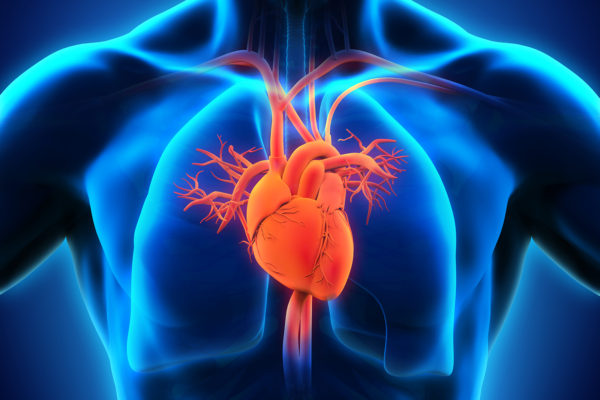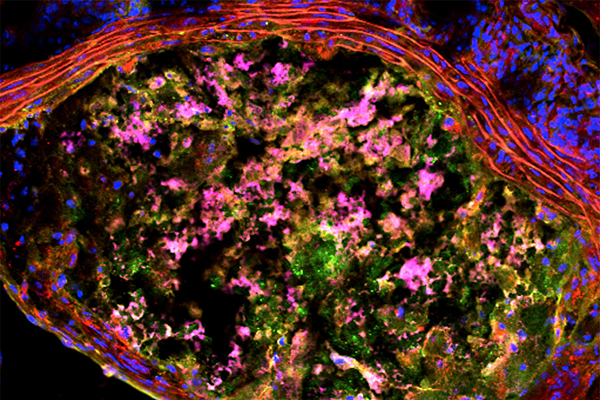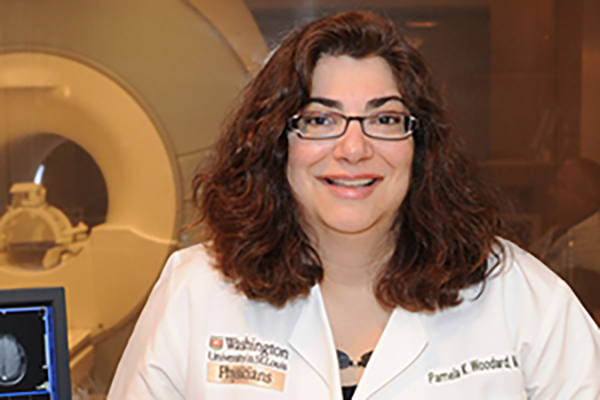Research suggests new contributor to heart disease
Medical professionals have long known that the buildup of plaque in arteries can cause them to narrow and harden, potentially leading to a whole host of health problems — including heart attack, heart disease and stroke. While high blood pressure and artery stiffness are often associated with plaque buildup, new research from engineers at Washington University in St. Louis shows they are not the direct causes. Their findings suggest a new culprit: elastic fibers in the arterial wall.
Atherosclerosis is Alzheimer’s disease of blood vessels, study suggests
Studying mice and tissue samples from the arteries of patients with atherosclerosis, researchers at Washington University School of Medicine in St. Louis suggest this plaque accumulation is driven, at least in part, by processes similar to the plaque formation implicated in brain diseases such Alzheimer’s and Parkinson’s.
Nanoparticle that lights up artery-clogging plaque to be evaluated in clinical trial
The Food and Drug Administration (FDA) has approved for testing in people a nanoparticle-based imaging agent jointly developed at the School of Medicine and collaborating institutions. The imaging agent may illuminate dangerous plaque in arteries, and doctors hope to use it to identify patients at high risk of stroke.
Protein that rouses the brain from sleep may be target for Alzheimer’s prevention
A protein that stimulates the brain to awaken from
sleep may be a target for preventing Alzheimer’s disease, a study by School of Medicine researchers suggests. David M. Holtzman, MD, head of the Department of Neurology, is the study’s senior author.
Clue to Alzheimer’s cause found in brain samples
Researchers at Washington University School of Medicine in St. Louis have found a key difference in the brains of people with Alzheimer’s disease and those who are cognitively normal but still have the brain plaques that characterize this type of dementia.
First detailed timeline established for brain’s descent into Alzheimer’s
Scientists have assembled the most detailed chronology
to date of the human brain’s long, slow slide into full-blown
Alzheimer’s disease. Through an international research partnership known as
the Dominantly Inherited Alzheimer’s Network (DIAN), scientists at
Washington University and elsewhere evaluated pre-symptomatic markers of Alzheimer’s disease in subjects from
families genetically predisposed to develop the disorder.
Alzheimer’s protein detected in brain fluid of healthy mice
One of the most promising markers of Alzheimer’s disease, previously thought only to be inside nerve cells, now appears to be normally released from nerve cells throughout life, according to researchers at Washington University School of Medicine in St. Louis.
Brain stents linked to higher risk of stroke, death
Artery-opening brain stents designed to reduce high risk of repeat strokes instead significantly increased strokes and deaths, results of a multi-center clinical trial show.
Cells talk more in areas Alzheimer’s hits first, boosting plaque component
Higher levels of cellular chatter boosts levels of amyloid beta in the brain regions that Alzheimer’s hits first, researchers at Washington University School of Medicine in St. Louis report. Amyloid beta is the main ingredient of the plaque lesions that are a hallmark of Alzheimer’s. The finding may help explain why areas that are most active when the brain rests are often among the first to develop these plaques, according to the researchers.
New model suggests feared side effect of Alzheimer’s drugs is unlikely
The first trial of a new model for testing Alzheimer’s treatments has reassured researchers that a promising class of drugs does not exacerbate the disease if treatment is interrupted.
View More Stories



